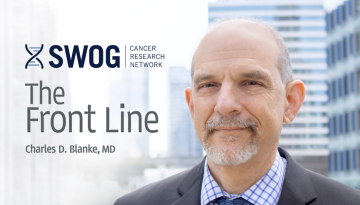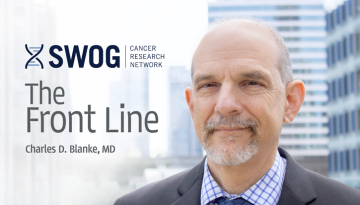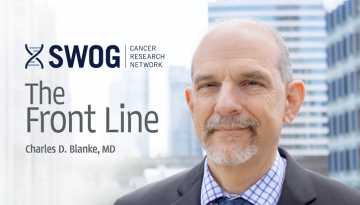The Front Line
Another Great Meeting in San Francisco
April 27, 2018
The SWOG spring meeting that just wrapped up was one of our very best. Clinical trial science and art, the embrace of the old and of the new, the inspiration regarding our patients – all of that was there, in spades, in San Francisco.
Here are select highlights:
- Our science continues to be so strong. The translational medicine plenary, with substance and a standing-room-only crowd, was stellar. Dr. Dave Tuveson gave us a look at predictive models for oncology precision medicine. Dr. Helen Chen walked us through the new Cancer Immune Monitoring and Analysis Centers created by NCI through the Cancer Moonshot. And Dr. Dan Hayes took us on a 25-year journey of cooperative group history focusing on correlative and translational medicine studies. Dan is stepping down as TM chair on the breast committee after 16 years in that role, and he got some gentle roasting (and a big thank you plaque). He even took a photo of the crowd’s standing ovation from the podium – not a “selfie” but an “audiencie” in his words – that he posted on Twitter. Dan never disappoints.
- Our general plenary was equally stellar. I think this one might just be my all-time favorite. For the Hope Foundation’s 25th anniversary, we had Dr. Jason Zell, one of the first winners of the Coltman Fellowship, announce the 19th and 20th winners, respectively. Jason gave an eloquent testimony to how the Coltman helped him launch a clinical trial and advance his career – the perfect set up for Drs. Siwen Hu-Lieskovan, Scott Kopetz, and Veena Shankaran. Their Hope funding helped them launch ground-breaking trials in highly diverse areas: immunotherapy, biomarkers, and financial toxicity. It helped that these are some of the hottest topics in cancer research today. Their work, and Jo Horn with her terrific speech, demonstrated Hope’s impact –and it was an incredible testimony to the power of Hope and the gifts it stewards. And keynote speaker Dina George Lansey, simply put, was a star. We all hear about racial disparities in health care, and in cancer trials, but she presented the problem – and some solutions – in a way that really connected with our members.
- Palliative and end of life care are clearly energizing our group. Their meeting was packed – over 120 attendees – and the speakers and the conversation itself were phenomenal. This committee in development has everyone talking – and tweeting!
- Still SWOG, but our name is still evolving. In the next few weeks, we will figure out how to formally add “cancer” and “research” into our name and, with Hope, rework our logos in an effort to build a better bridge – even if it’s a visual one – between the organizations. So, while we’re not dropping SWOG, we will be tweaking our name to make it better reflect what we do and, if we’re successful, the logo work can bring us closer to Hope.
- Eligibility criteria are a big buzz. With ASCO and Friends of Cancer Research calling for more inclusive eligibility criteria for clinical trials, and with NCI huddling now to come up with guidance on the issue, everyone was talking about how we should handle eligibility for SWOG studies. Until we have official policy, I will be talking with my executive team about how we can best help our investigators and protocol teams when it comes to this topic. So, stay tuned. Meanwhile, check out a new retrospective analysis released when the SWOG meeting was underway. A review of SWOG leukemia trials – read it here in Blood – found that patients who were deemed ineligible for clinical cancer studies, but who receive the study treatment anyway, had safety and efficacy outcomes comparable to eligible patients.
Other Recent Stories

Apr 12, 2024
SWOG's spring group meeting in Seattle last week was exhilarating

Mar 29, 2024

Mar 22, 2024
